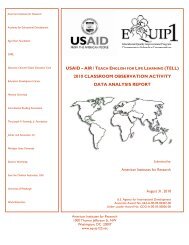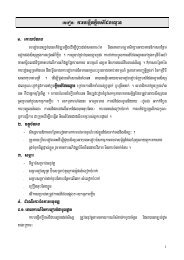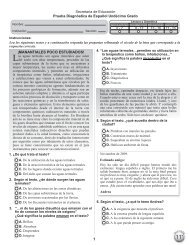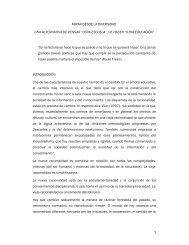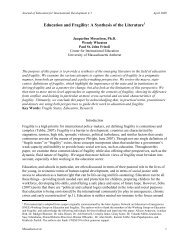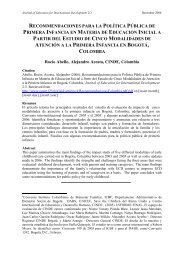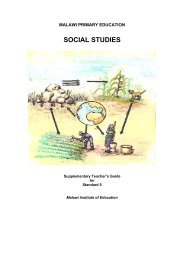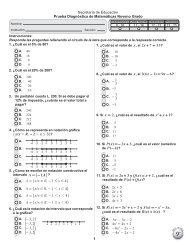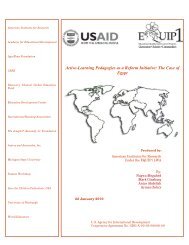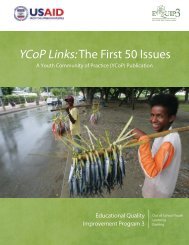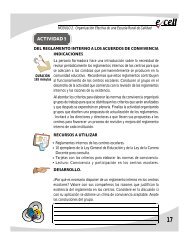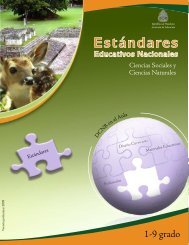The Power of Persistence: Education System ... - EQUIP123.net
The Power of Persistence: Education System ... - EQUIP123.net
The Power of Persistence: Education System ... - EQUIP123.net
Create successful ePaper yourself
Turn your PDF publications into a flip-book with our unique Google optimized e-Paper software.
• <strong>The</strong> continuing commitment to the<br />
use <strong>of</strong> information, evaluation, and<br />
communications. Both the 10-Year Plan<br />
and Plan 2021 were strongly branded with<br />
coherent communications strategies.<br />
Whether relatively swift or gradual,<br />
when viewing the cumulative<br />
experience <strong>of</strong> the past decades,<br />
significant change has occurred.<br />
With increasing maturity and<br />
steady progress, the current<br />
education system includes many<br />
elements that will help it to move<br />
towards the next stage <strong>of</strong> reform.<br />
In retrospect, the reform process<br />
has been more iterative than linear.<br />
It is difficult to identify one actor,<br />
project, policy, or event that made<br />
the biggest difference—although<br />
there have been a number <strong>of</strong><br />
notable individuals and programs<br />
throughout the reform. Rather,<br />
it is the interrelation <strong>of</strong> factors<br />
that created the momentum to<br />
make such dramatic change<br />
possible. <strong>The</strong> persistent challenge<br />
remains “one <strong>of</strong> ensuring effective<br />
implementation <strong>of</strong> what are<br />
<strong>of</strong>ten difficult institutional and<br />
behavioral changes”<br />
• <strong>The</strong> effective technical and financial<br />
partnerships with donors such as USAID<br />
enabled many <strong>of</strong> the key processes and<br />
structures <strong>of</strong> the period. To an unusual<br />
degree, the USAID programs in El<br />
Salvador “accompanied” the Ministry <strong>of</strong><br />
<strong>Education</strong>’s reforms rather than dictating<br />
them. <strong>The</strong> benefits <strong>of</strong> the collaboration<br />
were exceptionally close relations and<br />
trust between USAID, implementing<br />
partners, and MINED <strong>of</strong>ficials. <strong>The</strong><br />
technical support contributed to<br />
successful activities, which in turn<br />
enhanced the credibility <strong>of</strong> each Minister<br />
<strong>of</strong> <strong>Education</strong>. Through projects with<br />
—From Secondary <strong>Education</strong> in El Salvador:<br />
institutional contractors and local NGOs,<br />
<strong>Education</strong> Reform in Progress by C. Winter<br />
USAID played a facilitative role between<br />
MINED and civil society. By balancing its<br />
roles as an inside and outside actor, USAID was able to introduce new ideas<br />
and perspectives from world experts, support and encourage local leadership,<br />
enable productive interaction with civil society, and finance innovations and<br />
activities that would have otherwise been difficult to achieve.<br />
<strong>The</strong> March 2009 national elections resulted in the first FMLN president and<br />
administration in history, breaking ARENA’s 20-year hold on political leadership.<br />
This assumption <strong>of</strong> power by a left-wing party will introduce new and different<br />
philosophies, priorities, and personalities. <strong>The</strong> continuity <strong>of</strong> MINED leadership<br />
and technical expertise will be broken. In this transition, ARENA will need<br />
to learn how to function as a minority partner, and FMLN will learn how to<br />
manage from the leadership position. Over the coming years, the success <strong>of</strong><br />
previous strategies <strong>of</strong> consensus building will be tested, including the work <strong>of</strong><br />
the Presidential Commission in 2008. <strong>The</strong> results will only become clear over a<br />
period <strong>of</strong> years, as investments in civil participation, capacity, and knowledge<br />
mature throughout the system.<br />
SECTION 2: lESSONS fROM COUNTRY CASE STUdIES<br />
81



